I am getting mighty sick of the myths surrounding bicycle riding. As I am not in the mood for diplomacy tonight I am just going to go out on a limb and call "bullsh*t" on the whole lot of them. For the sake of something to do other than watch TV or scrub my sink out I will now present several instances of why these myths are simply myths and why they should all be chucked in the rubbish bin.
For the next few days, I will present, in no particular order, the counter to several of the stupid myths that many people labour under. These myths prevent all of us from having better conditions and keep people from improving their everyday lives.
#1 Some people are too weak/old/handicapped to ride.
OK. Having spent over a decade treating some of the sickest and most debilitated people you could possibly imagine, I will concede that there are people in the world who can not ride. You would be surprised to know how few of those people actually exist.
This is the back of my step-father, Richard. I took this picture just a couple of months after he had a bi-pass. The bi-pass was performed to repair a previously bi-passed vessel that had collapsed repeatedly over the 13 or 14 years since it had been placed along with three others. I stopped counting how many joint replacements he has had two years ago. He has hearing aides in both ears. He was recognized as Permanently Disabled by the state several years ago because of these and other health issues.
On this ride, his first since before the last surgery, he rode 23 miles across the San Fernando Valley.
Richard can no longer ride a standard two wheeled bicycle because his balance is compromised. To compensate for this he has switched to a recumbent trike. He isn't as fast as he used to be and taking hills requires patience. But he rides. Does he do it exclusively? Of course not. He gets tired and has to conserve his energy, but he uses his trike when he can and tries to do his local shopping and small errands by pedal power.
He is also working to get better infrastructure in his town of Chatsworth, CA. Just because he can't use it all the time doesn't mean that others can't and he wants them to have better than the currently do.
This girl looked to me as though she may have Down's Syndrome. Her mother had to walk quite quickly to keep up with her. How amazing would it be if San Francisco had a bicycle network that was developed enough that this girl could ride around her neighborhood with her Mom everyday instead of just when we close the streets to traffic. She obviously has the ability to ride, she just requires the opportunity to do so. How much would that add to her life can only be guessed at, but I am reasonably certain it would be significant, for her and her family.
Bicycles are adaptable, much like people. We can add wheels, move pedals, change gearing... many of those who can not walk can, with simple accommodations, ride a bicycle in the same way that those who are considered "able bodied" can. I know for a fact that it would be easier for this woman to ride her adapted trike along the Waterfront than it would be for her to try and get on Muni in a wheelchair to go the same distance. Don't believe me? Try it.
Can't take a walk with you wife? How about a ride?
Don't tell these people they are too old to ride.
So there you have it. People in San Francisco who have mobility challenges can, and do, ride bicycles. I am quite sure they would all like a better bicycle plan to make sure they can continue to do so.
Myth further debunked here and here and here. and here
Subscribe to:
Post Comments (Atom)
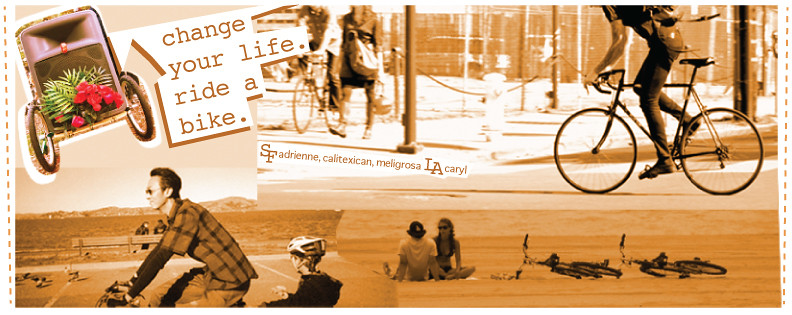

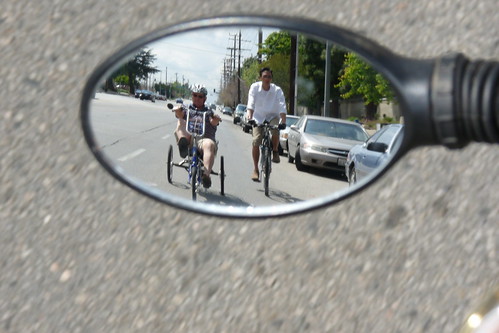
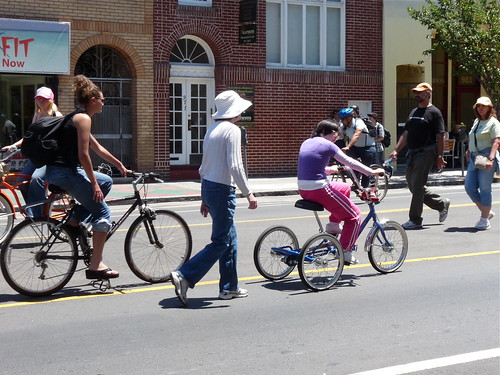

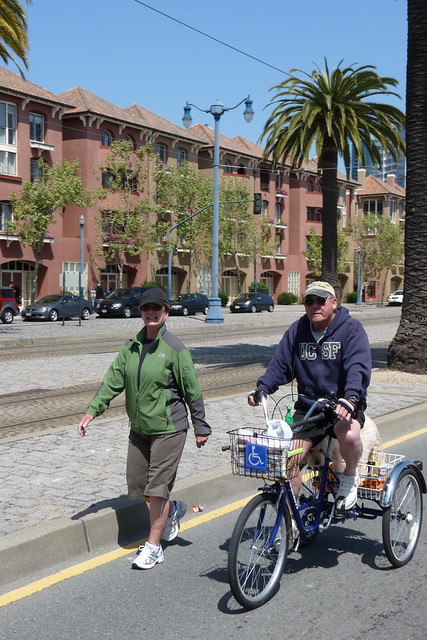
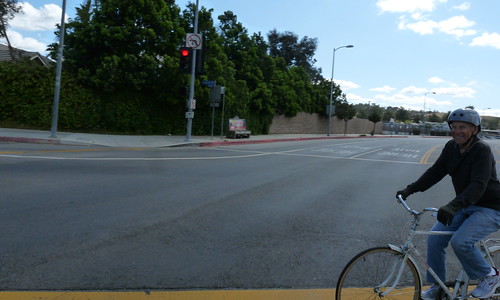
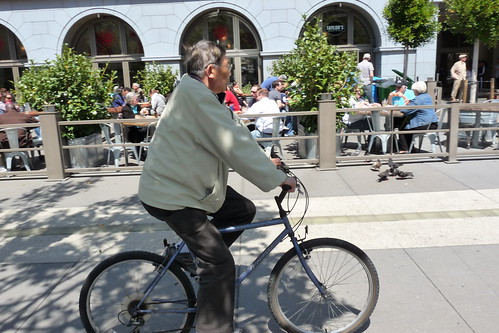





In my Neighbourhood in Dublin there is a Man who looks like he is a Paraplegic with something wrong with his Legs and one Hand and his Head gives a slight shake. However I often see him on his Three Wheeler Bicycle in the City getting his Shopping and Riding Home a distance of three miles part of this is up a two mile long Hill then another short Hill to where he Lives.
ReplyDeleteHe has a bit of difficulty Riding up the Hills but he manages to do it all the same. He could have put in for an Electric Mobility Schooter but didnt.
His Bike is the same type as the Man walking with his Wife in your Picture.
I often see People with Mobility Difficulty on Bikes and they seem to manage very well. A lot of these Bikes are Hand Pedaled from the Handlebars because they cannot use their Feet properly but they manage to get along.
Some inspiring stories... bikes are great!
ReplyDeleteQuite right too. I especially love that in the picture of the man and his wife their dog is hitching a ride too!
ReplyDeleteMost people I talk to who don't ride have a mindset problem not a physical problem. There are a few men here in their fifties that ride occasionally. Others stay housebound rather than submit to the danger and/or indignity of riding a bike.
ReplyDeleteI have a lot of trouble with my feet and ankles these days that cause me to not walk much. Sometimes I even limit my time just being on my feet. Big box stores and large grocery stores get limited visitation but I can ride a bike. Yesterday it was the grocery store and today I'm off to the library after I finish my oatmeal and coffee.
I have several motor vehicles available so I ride by choice. I have a folder so even motor trips are quite often a combination of motor and bicycle.
I'll be 72 in March.
Excellent post, Ade.
ReplyDeleteIn 2000, my father and I rode Cascade Bicycle Club's Seattle to Portland Bicycle Classic. Over 2 days we rode our bicycles 200 miles. We were beat, but felt a real sense of accomplishment.
As we were finishing up our post ride beer and meal, we heard all sorts of cheering for a group of riders coming in to the finish. This group of riders humbled us...a dozen "disabled" veterans on hand-cranked bikes.
Yes, these dozen riders rode 200 miles, cranking with their arms the whole way. We were amazed.
My Dad finally handed off his last bike when he was in his late 70s, though he kept skiing until 81! There's an older guy in my neighborhood who walks with a cane and still rides year-round. Here's a post about his bike on our local (Hartford, CT) bike blog:
ReplyDeletehttp://beatbikeblog.blogspot.com/2010/02/bikes-outside-barrio-style.html
Oldfool said: "Most people I talk to who don't ride have a mindset problem not a physical problem."
ReplyDeleteCorrection, Oldfool very well said.
I agree with you whole heartedly.
Word. Some of the most rewarding work I have ever done has been building bikes for folks that most would consider "disabled". One customer needed two canes to walk, extremely slowly and painfully. On his first visit, I sent him out on a test ride on a recumbent trike. When he returned, the elapsed time gave me the impression he had been around the block a couple of times. "Oh, no," he told me, "I went around Greenlake". The lake was over a mile from the shop, through traffic, and the trail around it is 2.8 miles. Once we got him properly set up, he was unstoppable. Val
ReplyDeletePleasant article! I have been using a wheelchair since a 1971 head injury. Then rode a 3-wheel bike from 1976 to 1979, a recumbent trike since 1980, and a recumbent trike and/or an enclosed velomobile since 2005. It was a true joy to me riding in San Francisco Sunday Streets ciclovia in August of 2010.
ReplyDeleteOF- these young folks can be awful thick sometimes : )
ReplyDeleteAnon 10:27- I am glad you enjoyed the piece! If you live in SF, are you speaking out about your experiences here? I really feel that the mobility challenged riders out there are not represented well enough.
I am so tired of people who think that only 20 somethings on fixed gear bikes ride in the City.
Also see this article on people with Parkinson's that are unable to walk but are able to ride bicycles:
ReplyDeletehttp://www.nytimes.com/2010/04/01/health/01parkinsons.html
great post ade. being by where I live I see more variety than people think of, and it's funny to me that the so called "20s on fixies" are never to be seen on mi neck of the woods. cuz 'it's so far...' right. watever, really.
ReplyDeleteDont let the mission attitude get to you or generalize a thought of demographic, because riding on polk st I see far more vareity on demographics than on valencia, at anytime.
I actually see this guy on a recumbenat e/morning almost. he looks older and is awlays smiling.
he makes me happy
so yay blegh - no burritos on this post
rock on!!
Dodge- Because Parkinson's Disease effects the brain and not the muscles. per se, it is interesting to see what people with the disease can do. I had a patient about 10 years ago who was losing her ability to walk but she could still ballroom dance beautifully. It is because the part of your brain that controls walking is different than the one that controls dancing. It is the same with riding a bicycle. It can be really amazing to watch.
ReplyDeleteAlso, Dodge, I added your link to the post. I meant to do it while I was writing it but it was late and I got loopy : )
ReplyDeleteThanks, Adrienne, for the article and for including the link to the story.
ReplyDeleteGreat article! Three comments:
ReplyDelete(1) If you don't already know John Waterman, you should. He's been running a program for bicyclists with disabilities for decades, and he is probably the nation's best expert on assessing the rider's ability to match the rider with the least restrictive environment, whether that be the back of a tandem on a closed course or the open highway or anything in between. He is at jwaterman[at]bikeprogram.org
(2) What's important is that we demand that people accommodate each other. The only thing that can make a road unsafe is if people drive like jerks. What could be more humane that slowing down to pass safely someone on a human powered machine, regardless of his/her abilities or lack thereof.
(3) You've already heard this, but it bears repeating: most attempts to make the built environment safe to "separate" motor and non-motor traffic actually cause accidents. Last month there was a fatality in Minneapolis, caused by a bike lane design that had actually been ripped out of Davis, CA because of bad experiences in Davis. The engineers in Minneapolis ignored that literature about Davis, and the result was tragic. So don't just push for "separated something." It is almost guaranteed to suck. What we DO need is a very simple change: the attitude that roads are for people -- all people.
John Schubert
Limeport.org
schubley@aol.com
thas rite !!! cradle to the grave !
ReplyDeleteRAD inspiring myth busting post. huge props for making it. we're all gonna get there, sooner or later. <3
Despite MExico city being one of the hardest cities to ride a bike, there are several elderly people on bikes always, I've even seen an granpa in this really cool old steel old school road bike with his grandson on a rack.
ReplyDeleteIt's curious that you published this, as a couple of weeks back a newsflash publish a story about how dangerous bicycling it's here, how many poeple died daily hit by a car (how stupid you have to be to not see that's road rage of motorists) and how we cyclist are so irresponsible by not wearing a helmet (even more stupid)
So well we have to be more united than ever, to fight agaisnt this global car empire and the stupid ideas it has make about transportation.
Cyclist of the world assembly!